12 February 2011
McCarran-Ferguson
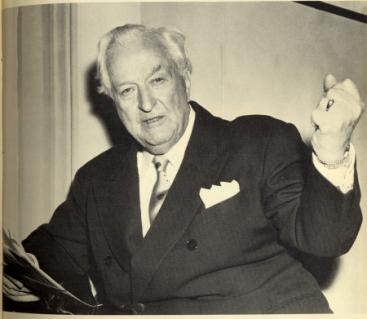
(Senator Patrick McCarran (D-NV) at the end of his days in the Senate.)
“One only needs two tools in life: WD-40 to make things go, and duct tape to make them stop.”
- G. Weilacher
It is an interesting morning. I find myself agreeing with Bob Herbert, the columnist in the New York Times in his musing about the spectacle of Egypt’s attempt to establish a working democracy, and America having its slip away. We seem mired in confusion, though it is plain that things are off the rails. They don’t have to be. We just won’t make up our minds to do something about it.
It struck me as being completely in keeping with the events that have caused me to fulminate this week about what we have permitted to happen to us in this grand experiment of a Republic.
I was shredding the McCarran-Ferguson Act for the story this morning, and then had to step back. Everything is both simpler and more complex than it appears. H. L Menken said it best a long time ago: “to every complex problem in human affairs, there is a solution that is neat, plausible and wrong.”
I have selected some poster children for what is wrong this week. My nomination for spectacular idiocy is the way Health Care reform was put on the books. The process of the sausage-making of legislation is always fun, and this one was one for the ages.
The end game- the concessions to Sen. Landrieu ($100 million for Louisiana) and Sen. Ben Nelson (The Cornhusker Kickback is an agreement for the Federal government to cover 100% of Nebraska's health care bill for an indefinite amount of time) leaves one breathless.
I have said it before, but I am still amazemed at what happened. It went like this: we had the biggest financial shock and dislocation in eighty years, caused by greedy crooks on Wall Street, and abetted by a corrupt revolving-door oversight process.
The crisis rocked the foundation of international finance and cast America into a tailspin. It contributed to a dramatic rise in commodity prices (those bastards at Goldman Sachs again) and contributed to global unrest.
In response, we got the bi-partisan bail-out amounting to trillions of dollars, orchestrated first by pro-deregulation Bush and former Goldman Sachs Chairman Paulson (to save GS, but not Lehman Brothers, a key competitor) and then a big sloppy follow-on giveaway dripping with pork from President Obama.
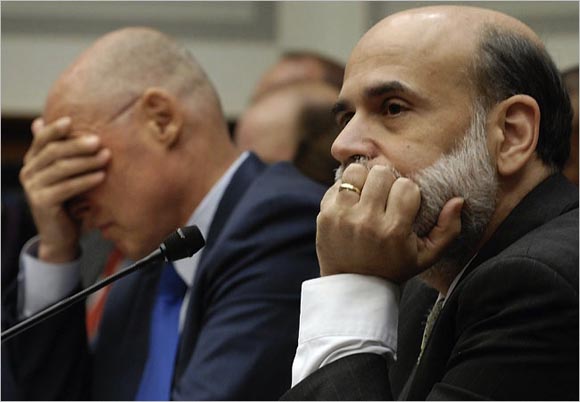
(Former Goldman Sachs CEO Hank Paulson (and Secretary of the Treasury) sits with FED Chairman Ben Bernanke at Congressional hearing in 2008. AP Photo.)
Then, with laser like focus, we launched off onto another wild quest to seize the health care industry and extend benefits to thirty million citizens, many of whom have real needs and at least as many are young, healthy and have no current interest in paying for services they do not yet need.
On the way to the final legislation, Rahm Emanuel (the President is curiously disengaged from the day-to-day process of sausage-making) gave Billy Tauzin $80 billion to placate the Pharm, and ignored McCarran-Ferguson, the Act that has stood since 1945 to exempt the insurance industry from the provisions of the Constitution's interstate commerce clause. To seal the deal there was wild back-room dealing all the way. Some provisions of Obama Care were pressed off into the distant future, not so much for the citizens, but rather to permit the lawyers for the concerned commercial sector to craft strategies to deal with it to best advantage.
I am a natural cynic about all this. Human nature contains both the capacity for sacrifice and the compelling force of naked greed, and we tend not to spend too much time on the side of the angels. Greed has been on the ascendancy since the days of Senator Pat McCarran and Homer Ferguson.
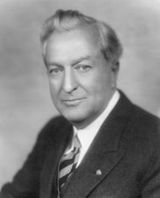
(Senator Pat McCarran (D-NV) in his prime.)
Pat McCarran was a real piece of work. Most of us know him only as an airport; McCarran Field is the entry portal for most people to the bizarre American institution of Las Vegas, founded on gangster money, and representing the poor man's version of the casino that Goldman Sachs has made of the financial sector of the larger economy. I hesitate to call him corrupt without further investigation, but as the political boss of Nevada at the time of the infusion of Mob money to the state, I don't think it would be hard to find. Some say he is the model for fictional Senator Patrick Geary in "Godfather II."
He was much more than that. Drew Pearson called him "The Senator from Madrid" for his fervent support of Franco's fascist government, and that of Chaing Kai-Shek. His Wikipedia bio concentrates mostly on his rapid anti-communism, which gained him a place as a myopic mole character in Walt Kelly's Pogo comic strip. The bio mentions his contributions to civil aeronautics and airport legislation, but curiously omits reference to his active involvement to indemnify the insurance industry from Federal Regulation in 1945.
His public persona is defined by this quote, which frankly resonates with me today on the subject of immigration:
"I believe that this nation is the last hope of Western civilization and if this oasis of the world shall be overrun, perverted, contaminated or destroyed, then the last flickering light of humanity will be extinguished. I take no issue with those who would praise the contributions that have been made to our society by people of many races, of varied creeds and colors. America is indeed a joining together of many streams that go to form a mighty river which we call the American way. However, we have in the United States today hard-core, indigestible blocs which have not become integrated into the American way of life, but which, on the contrary are its deadly enemies."
But that is a just a sidelight on what the man did to influence the future for us all.
McCarran was joined by a Michigan Republican named Homer Ferguson whose legacy includes his bi-partisan support for exempting the insurance industry to Federal Regulation and the insertion of the words "under God" into the Pledge of Allegiance. He may also have contributed to the behind-the-scenes destruction of Preston Tucker, the innovative car designer who challenged the Big Three automakers.
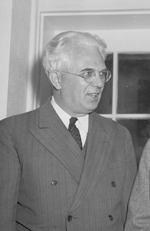
(Senator Homer Ferguson, R-MI)
Having had to use my health entitlement this week, it brought home the reality of how crappy the delivery of health care really is, and why it is the way it is.
My sense is that McCarran's public ideology permitted an ethical (and financial) collusion with price fixers in the insurance business on a high philosophical plain. McCarran-Ferguson, the signature legacy of his service, has such backing in the industry that Emanuel immediately bypassed the first and most logical step in reigning in the obscene overhead and administrative costs (ranging to an estimated 32% of all health costs) that the insurance industry inflicts on the health care sector. The House did pass overwhelmingly a provision in their bill to repeal M-F, but despite Sen Patrick Leahy's efforts, the matter was quietly dropped in the Senate.
That is similar to the original M-F, which Congress passed primarily to remedy the Supreme Court case of United States v. South-Eastern Underwriters Association, 322 U.S. 533, 64 S. Ct. 1162, 88 L. Ed. 1440 (1944). It was intended and sold as a temporary measure in 1945 to enable the industry to restructure.
You could cast it as a states rights issue, which McCarran did, though it eludes me how a multi-state, multi-million dollar enterprise could not be considered a "commerce," eligible to be regulated by the Federal government.
The Supreme Court agreed with that, and thus Congress had to step in to protect the insurance companies and ensure they could continue to set agreed rates between them, and otherwise carry on as they chose under the wildly disparate State laws that therefore governed their conduct.
This rapidly gets so complex that there can be lucid arguments in all directions, just as there are for all fundamental laws governing the big industry complexes. I recall the sardonic observation of Senator Kerry (the good one) when I was attending a SSCI hearing during the tumultuous passage of the 1995 Telecommunications Act. Laughing, the Senator quipped that he had a hard time getting to this hearing due to the throng of "concerned citizens in expensive suits" who were lining up to make their opinions known to the Telecommunications Subcommitte.
Like the Senator, I am a cynic and don't expect anything different. But it is this way across the board, and where the industry calls the shots, and in the health care and finance sectors can get so far off the reservation that it threatens the national security, I take umbrage.
Anyway, according to the William and Mary Law review: M-F provided "a temporary moratorium during which the Sherman and Clayton Anti-trust Acts would not apply; subsection (b) exempted seven specific activities from the scope of the Sherman Act; and subsection (c) stated that the Sherman Act, even during the moratorium, would apply to any act of boycott, coercion, or intimidation."
The conference committee to reconcile the House and Senate versions of the bill deleted the provision that the bill would sunset in 1948, making it permanent, and President Roosevelt signed it into law in March of 1945. We have had it ever since.
There is another view of all this, from an industry apologist. Blogger David Hyman said the enthusiasm about repeal (which I note has not been echoed in the Senate) is that it serves three purposes in the sausage-making process:
* Payback to the industry for an October 2009 report by the health-insurance lobby finding that the Democrats’ legislation would result in higher premiums.
* The desire of Democrats to “do something” on health reform — and to be seen as doing something.
* A litmus test for legislators to showboat on whether they are for “the people” or the “big insurance companies.”
The pharmaceutical giants were cast with the black hats in the failed ClintonCare circus; this time, it was supposed to be the insurance companies.
It didn’t work out that way. Instead, while the Health Care Bill may be the poster child for out-of-control entitlements, it is Social Security and Medicare that have to be the subject of some real serious debate.
The Concerned citizens in expensive suits are going to take care of themselves. By recent tally, there are six health industry lobbyists in this town for every member of Congress.
I had to think of that while listening to the wild exuberance coming out of Cairo. They toppled a government and may have an opportunity to govern themselves. It will be interesting to see, though the impact may not be in our interests here, but what the hell.
What is going on here is not in our interests, either. The Times quoted an Egyptian joke from the 1980s that went something like this:
Hosni Mubarak is riding in the back of his limousine. The car approaches a fork in the road. He asks his driver which way President Nasser went.
The driver responds: “Always left, Sir.”
“What about President Saddat?”
“Always right, Sir.”
“Very well,” Said Mr. Mubarak. “Signal left, then right, and park,”
That is apparently what we have decided to do right here, park the car and wait on the edge of a mountain road, with a big effing landslide coming our way.
It might even be a Tucker: really sleek and cool, and going nowhere. I wonder if we should get out of the car?
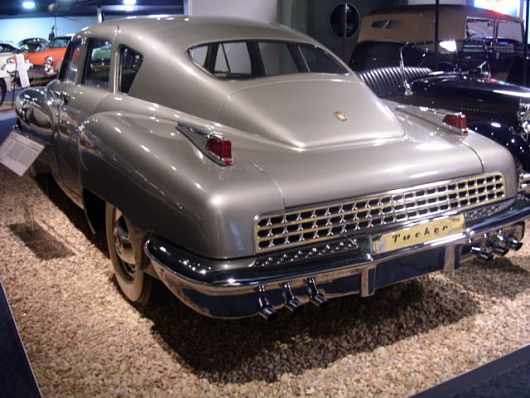
(Tucker Sedan. Photo National Auto Museum, Reno, NV.)
Copyright 2011 Vic Socotra
vicsocotra.com | Subscribe to the RSS feed!